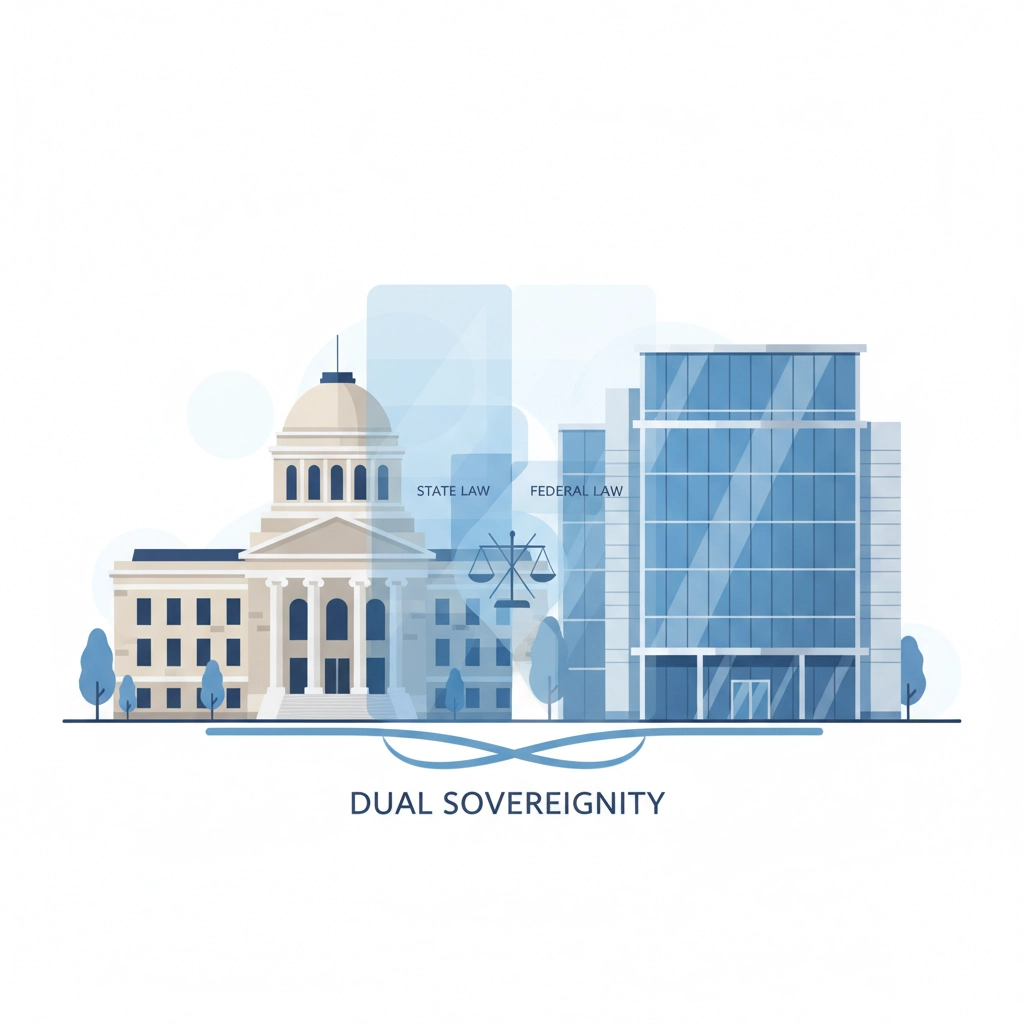Which Government Writes Criminal Laws? The Truth About Federal vs. State Authority (And Why It Matters for Your Case)
- brookthibault
- Nov 4, 2025
- 5 min read
If you're facing criminal charges, one of the most confusing aspects can be understanding exactly which level of government has authority over your case. The answer isn't straightforward: both state and federal governments write criminal laws, but they operate in distinct spheres of authority. Understanding this division can dramatically impact your defense strategy, potential penalties, and even which court system handles your case.
The Foundation: How Criminal Authority Is Divided
Both state and federal governments possess the power to create and enforce criminal laws, but they don't overlap completely. This division stems from our federal system of government, where certain powers are reserved for states while others belong to the federal government.
State governments handle the vast majority of criminal cases you encounter daily. Think burglary, assault, DUI, domestic violence, murder, and theft: these typically fall under state jurisdiction. Each state, including Virginia, has developed its own comprehensive criminal code tailored to local values and concerns.
Federal authorities focus on crimes that cross state lines, threaten national security, or involve federal interests. Bank robbery, immigration offenses, drug trafficking across state borders, terrorism, and crimes on federal property typically become federal matters.

Virginia's Criminal Law Landscape
In Virginia, the state legislature writes most of the criminal laws that residents encounter. Virginia's criminal code covers everything from traffic violations to serious felonies, with penalties and procedures specifically designed for cases within state borders.
However, certain actions in Virginia can trigger federal jurisdiction. For example, if you're charged with drug trafficking that involves transportation across state lines, or if you're accused of a crime on a military base like Naval Station Norfolk, federal prosecutors may take the lead.
Virginia's proximity to Washington, D.C., and its numerous federal facilities means residents face a higher likelihood of encountering federal jurisdiction than those in some other states. The Eastern District of Virginia federal court system is particularly active, handling cases throughout the Coastal Virginia region.
Why Federal vs. State Authority Matters for Your Case
Understanding which government has jurisdiction over your charges isn't just academic: it can fundamentally change your entire legal experience.
Different Court Systems Mean Different Rules
State and federal courts operate under different procedural rules, have different judges, and follow different sentencing guidelines. Federal courts typically move more slowly but have more resources. State courts handle higher volumes of cases but may process them more quickly.
Prosecutorial Power Varies Dramatically
Federal prosecutors have broad discretion in choosing which cases to pursue and often have more resources at their disposal. They can choose to take over cases that might otherwise be handled at the state level, especially when they believe federal penalties will be more severe.
State prosecutors in Virginia work within the local community and may have different priorities than federal authorities. They're often more familiar with local judges and court procedures.

Sentencing Differences Can Be Substantial
Federal sentences are often longer and mandatory minimums more common. Virginia state courts may have more flexibility in sentencing, particularly for first-time offenders or less serious crimes.
Federal convictions also carry additional consequences like restrictions on federal benefits, immigration implications, and limited pardon opportunities compared to state convictions.
Common Areas Where Jurisdiction Overlaps
Several types of crimes can be prosecuted by either state or federal authorities, creating strategic considerations for your defense:
Drug Crimes: Simple possession typically remains a state matter, but trafficking, especially across state lines, often becomes federal. The amount involved and evidence of interstate activity influence which prosecutor takes the lead.
Weapons Charges: Virginia handles most gun crimes under state law, but federal authorities may intervene when weapons cross state lines, involve certain prohibited persons, or occur during other federal crimes.
White-Collar Crimes: Fraud, embezzlement, and similar offenses can be prosecuted at either level depending on the scope, victims involved, and amount of money at stake.
Violent Crimes: While typically state matters, federal authorities may step in when crimes occur on federal property, cross state lines, or involve certain aggravating factors.
The Strategic Implications for Your Defense
When you're facing charges, the jurisdiction question affects every aspect of your defense strategy:
Legal Representation Requirements
Federal cases require attorneys admitted to practice in federal court, while state cases need attorneys licensed in Virginia. Some attorneys practice in both systems, but expertise levels can vary significantly.
Discovery and Investigation Procedures
Federal and state systems have different rules about what evidence prosecutors must share with defense attorneys and different timelines for investigation and trial preparation.

Plea Bargaining Approaches
Federal prosecutors often have different plea bargaining policies than state prosecutors. Understanding these differences can influence whether to negotiate early or prepare for trial.
How Prosecutors Decide Which System Takes Priority
When crimes could be prosecuted in either system, several factors influence the decision:
Severity and Scope: More serious crimes or those with broader impact often attract federal attention.
Available Resources: Federal authorities may defer to state prosecutors when state penalties are adequate and federal resources are needed elsewhere.
Policy Priorities: Federal priorities shift over time, affecting which types of cases receive federal attention.
Evidence and Strength of Case: Prosecutors consider which system gives them the best chance of successful prosecution.
Protecting Your Rights Across Both Systems
Regardless of jurisdiction, certain constitutional protections apply to all criminal defendants:
Right to legal representation
Protection against unreasonable searches and seizures
Right to remain silent
Right to due process
Protection against double jeopardy
However, the application of these rights can vary between federal and state systems, making experienced legal counsel essential.

Virginia-Specific Considerations
Virginia's legal landscape presents unique challenges and opportunities:
State Court Advantages: Virginia judges and prosecutors may be more familiar with local circumstances and community standards. State sentencing guidelines might offer more flexibility for certain offenses.
Federal Court Considerations: The Eastern District of Virginia is known for its "rocket docket": fast-moving federal cases that require quick preparation and decision-making.
Virginia's proximity to federal facilities and interstate highways means many crimes that might be purely state matters elsewhere can easily become federal cases here.
When to Seek Professional Legal Guidance
The complexity of federal versus state authority makes professional legal counsel crucial when facing any serious criminal charges. Early intervention by an experienced attorney can help:
Determine which system is likely to prosecute your case
Develop appropriate defense strategies for the specific jurisdiction
Navigate plea negotiations effectively
Protect your rights throughout the process
Understanding these jurisdictional complexities empowers you to make informed decisions about your defense, but it shouldn't replace professional legal advice tailored to your specific situation.
Take Control of Your Legal Future
The division between federal and state criminal authority affects every aspect of your case, from initial charges through final resolution. Whether you're facing state charges in Virginia Beach, Norfolk, or Chesapeake, or dealing with federal prosecutors in the Eastern District of Virginia, understanding these differences gives you the foundation to work effectively with your legal team.
Don't let jurisdictional confusion compromise your defense. The experienced attorneys at Coastal Virginia Law understand both federal and state systems and can help you navigate whichever path your case takes. Contact us today for a consultation to discuss your specific situation and develop the most effective defense strategy for your circumstances.


Comments